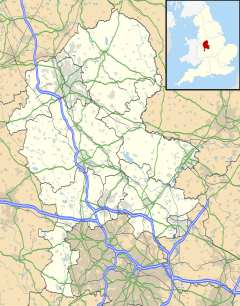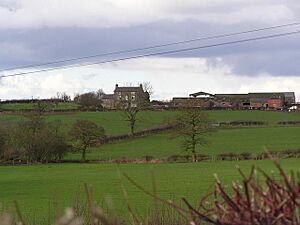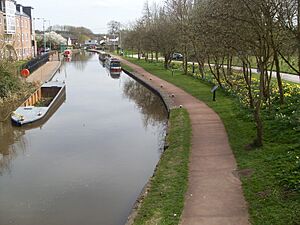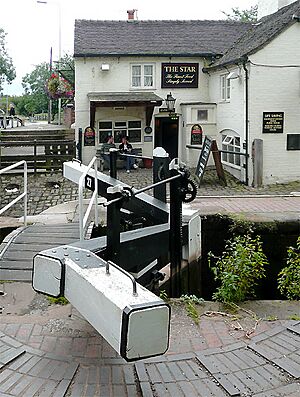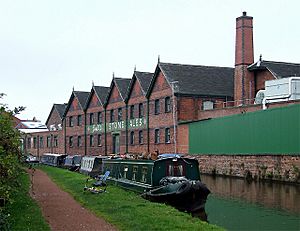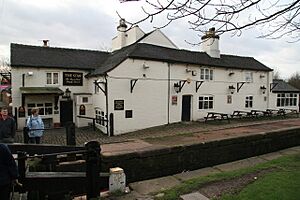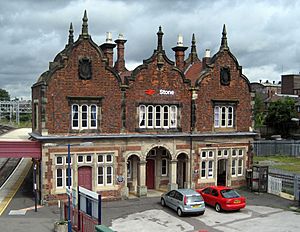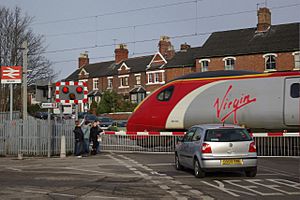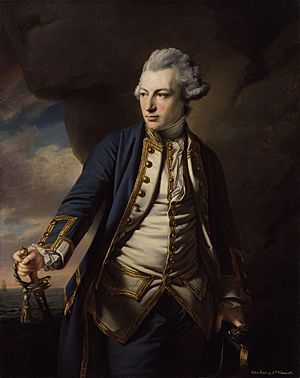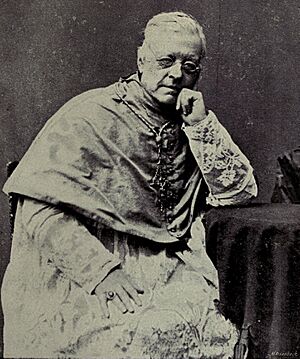Stone, Staffordshire facts for kids
Quick facts for kids Stone |
|
|---|---|
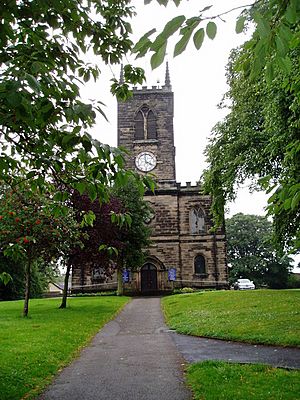 St Michael's Church, Stone |
|
| Population | 17,278 (2021 Census) |
| OS grid reference | SJ902342 |
| Civil parish |
|
| District |
|
| Shire county | |
| Region | |
| Country | England |
| Sovereign state | United Kingdom |
| Post town | STONE |
| Postcode district | ST15 |
| Dialling code | 01785 |
| Police | Staffordshire |
| Fire | Staffordshire |
| Ambulance | West Midlands |
| EU Parliament | West Midlands |
| UK Parliament |
|
Stone is a lively market town and civil parish in Staffordshire, England. It's about 7 miles (11 km) north of Stafford and 7 miles (11 km) south of Stoke-on-Trent. Stone is known for its history, dating back to the Bronze Age. The Trent and Mersey Canal greatly shaped the town's growth and industries.
Stone was once managed by different local councils. In 1974, it became part of the Borough of Stafford. The town's population has grown steadily over the years. In 2021, about 17,278 people lived there.
Contents
What's in a Name? The Story of Stone
The name "Stone" means exactly what it says: a "stone" or "rock." It comes from the Old English word stān.
A local legend says the town was named after a pile of stones. These stones were supposedly placed over the graves of two princes, Ruffin and Wulfad. The story claims their father, King Wulfhere of Mercia, killed them in AD 665. This was because they became Christian. However, this story is probably not true. King Wulfhere was already Christian when he became king. Also, the original story it's based on happened elsewhere and much later.
More recent ideas suggest other reasons for the name. There are old Roman-British sites near Stone. The name might refer to stone remains of a bridge or a milestone from a Roman road. Another idea is that the town was named after a large stone or a place where building stone was found. A sandstone area north of Stone was used for quarrying. This could be the "stone" the town is named after.
Stone's Past: A Journey Through Time
Stone has been inhabited since ancient times. A Bronze Age ring ditch at Pirehill shows people lived here long ago.
Early Settlers and Legends
During the Iron Age, Stone was home to the Celtic tribe called the Cornovii. Their name means "people of the horn." They had a hill fort nearby that overlooked the River Trent. This area was important for salt production.
The very early history of Stone is a bit unclear. There's the medieval story about the Saxon princes Wulfad and Rufin. This tale says they were murdered by their father, Wulfhere of Mercia. They were supposedly buried under a pile of stones. But historians say this story is not accurate.
From Priory to Parish Church
A church was built over the supposed graves of Wulfad and Rufin around 670 AD. It was destroyed by Danish invaders in the 9th century. In 1135, the Augustinian Stone Priory was built in its place. This priory lasted until King Henry VIII closed it down. The priory building fell apart in 1749. The current St. Michael's Church was built in 1758. Only the old stone foundations of the priory remain under Priory House.
Stone was part of the Pirehill hundred area. In 1251, King Henry III gave Stone a special permission called a royal charter. This allowed Stone to hold a market.
The Common Plot and a Royal Camp
The Common Plot, also known as Mudley Pits, is a large area of open land north of Stone. It was set aside for the town's residents in 1798. This happened when the old farming fields were enclosed by an act of Parliament.
During the winter of 1745-1746, Prince William, Duke of Cumberland built a large army camp here. You can still see parts of it today. The camp's purpose was to move his army from the cold Staffordshire Moorlands. They were trying to stop 6,000 Jacobite rebels from marching on London. The rebels were thought to be using mountain routes. Stone was also important to stop any rebel groups from going to Wales to get more fighters. But as winter came, the Jacobites decided to go back to Scotland.
Stone used to be an "urban district" with its own council. This changed in 1972. Now, it's part of the Stafford Borough Council and has a Stone Town Council.
Roads: A Busy Coaching Stop
Stone sits in the valley of the River Trent. It was a very important stopping point for stagecoaches. In the 18th century, many roads became "turnpiked," meaning you paid a toll to use them. An 1851 guide said Stone was a "very lively town." It was a major route for coaches, carriers, and travelers. More than 38 stagecoaches passed through Stone every day!
The main coaching route was from London to Holyhead. It went through Lichfield and then along the A51. Stone had many coaching inns to provide rest for horses and travelers. Famous inns included the Crown Hotel and the Red Lion.
The Trent and Mersey Canal: A Watery Highway
The River Trent runs through Stone. It had been used by boats since Roman times. But further inland, only small boats could travel. The water level changed a lot, making it hard to use. Before modern roads, land travel was slow. Delicate goods often broke on rough roads.
James Brindley, a famous canal builder, proposed building the "Grand Trunk Canal" in 1766. This canal would connect the Mersey and Trent rivers. Josiah Wedgwood, a famous potter, supported the idea. He saw it as a great way to bring raw materials to his potteries. It would also help transport his finished goods to customers.
By September 29, 1772, 48 miles of the Grand Trunk Canal were ready. This section, now called the Trent and Mersey Canal, went from Wilden Ferry to Stone. A big opening ceremony was held when the Star Lock was finished. A cannon was fired in celebration, but it accidentally damaged the new lock! It had to be rebuilt.
Stone became the main office for the canal company. Its office was at Westbridge House. Later, the offices moved to Stoke-on-Trent.
Brewing: Stone's Beer History
Stone had two breweries because of its good local water. This continued the tradition of beer making from the old Augustinian monks. The most famous was John Joule & Sons Ltd, started in 1780. This company was bought by Bass Charrington in 1968. Brewing stopped in Stone in 1974. The brewery was torn down in 1977. The canal was very important for sending beer to other places.
Another brewery was Montgomery & Co. It was bought by Bent's Brewery Co in 1889. This brewery was also taken over by Bass and closed in 1968. Even though brewing stopped for a while, it has started again. The Lymestone Brewery opened in 2008. This family-run brewery is in part of the old Bent's brewery building.
Another microbrewery, called Joules (without the "John"), now brews in Market Drayton. You can find these local beers in many pubs in Stone and the area. Lymestone Brewery even has its own pub, The Borehole Inn. The Star pub, a very old building, got its full license in 1819. It used to be a butcher's shop. It relied a lot on trade from the canal.
Railways Arrive
The arrival of the railway changed Stone. It ended the town's time as a major coaching and canal center. The North Staffordshire Railway opened its main line through Stone in 1848. A branch line from Stone to Colwich started in 1849.
One industry that did well with the railway was shoe making. In 1851, there were 16 shoe factories. However, this industry declined after Australia, a main market, added an import tax on shoes.
Stone Today: What's Happening Now?
Stone Parish Church, dedicated to Saint Michael, is at the south end of town. It was built between 1753 and 1758. The clock dates from 1896. Christ Church is on the north side of town and was built in 1839.
The canal is still a big part of Stone. Many old canal-side areas are now used for modern homes. For example, The Moorings apartments are built where an old warehouse used to be.
Today, the canal is mostly used for fun, not cargo. Many leisure boats pass through Stone each year. The Canal Cruising Company still works from the old canal maintenance site. This restored area is used to fix pleasure boats. In 2010, a new marina opened south of town. It has places for boats, a farm shop, and a café.
Education in Stone
Stone has a three-tier school system. This means there are first schools, primary schools, and two middle schools (Walton Priory Middle and Christchurch Academy). The high school is Alleyne's Academy. For private education, there's the Catholic St Dominic's Priory School. It was founded in the 19th century.
Local Services and Businesses
The headquarters for Staffordshire Fire and Rescue Service is just south of Stone. Yarnfield Park Training and Conference Centre is a big training center for the UK phone industry. It's owned by BT Group.
Stone is also where the Quickfit laboratory glassware system is made. This glass equipment is used in many school and university science labs. The National Association of Chimney Sweeps is also located in Stone.
Sports and Festivals
Stone has two football clubs: Stone Old Alleynians F.C. and Stone Dominoes F.C.. Both teams play at Springbank Park in Yarnfield. Staffordshire County Cricket Club plays matches at Lichfield Road. Stone Cricket Club also plays there.
The Stone Food and Drink Festival happens every year in early October. It showcases local food and cooking talent. Over 20,000 visitors come to the town for this week-long event. The main part of the festival is held at Westbridge Park.
Media: Staying Connected in Stone
Television and Radio
For TV news, Stone gets BBC Midlands Today and ITV Central from Birmingham. You can usually get good TV signals from Sutton Coldfield and The Wrekin.
Local radio stations for Stone are Hits Radio Staffordshire & Cheshire and BBC Radio Stoke. These broadcast from Stoke-on-Trent. Some parts of town can also pick up other radio stations from the West Midlands and North West.
Newspapers and Websites
Stone is covered by two daily newspapers: The Sentinel (from Stoke-on-Trent) and the Express and Star (from Wolverhampton). The weekly Staffordshire Newsletter and the bi-monthly Stone and Eccleshall Gazette also cover the town.
Stone also has its own independent community news website called A Little Bit Of Stone. It provides up-to-date news and information for residents and visitors.
Football Clubs
- Stone Old Alleynians F.C.
- Stone Dominoes F.C.
Getting Around Stone
Stone railway station is on the West Coast Main Line. Since 2008, there's been an hourly train service. It goes south to London Euston and north to Crewe via Stoke-on-Trent. More people are using the train, with passenger numbers rising a lot between 2008 and 2012.
Stone's main bus service is the First Potteries' route 101. It goes north to Newcastle-under-Lyme and Stoke-on-Trent. It also goes south to Stafford. The D&G Bus company runs services on Sundays and other local routes.
Two main roads pass through Stone: the A34 (linking Birmingham to Manchester) and the A51 (linking Lichfield to Chester). The M6 motorway goes around Stone, not through it.
Cycling paths along the canal towpath have improved. In 2012, local authorities announced a £700,000 plan to make new paths. You can cycle south towards Burston, but a mountain bike is better for that route.
Interesting Buildings
Stone has many interesting buildings. These include the Grade II listed Hayes House and the Catholic chapel of St Anne.
Famous People from Stone
- Werburgh (died 699) – An Anglo-Saxon princess born in Stone.
- James Brindley (1716 – 1772) – The main surveyor for the Trent & Mersey Canal.
- John Jervis, 1st Earl of St Vincent (1735 – 1823) – A naval hero who worked with Lord Nelson. He won the Battle of Cape St Vincent in 1797.
- Peter De Wint (1784 – 1849) – A famous landscape painter.
- William Bernard Ullathorne (1806 – 1889) – A Roman Catholic Bishop, buried in Stone.
- Eva Morris (1885 – 2000) – Was the oldest person in the world for a time. She lived in Stone.
- L. T. C. Rolt (1910 – 1974) – An author who wrote about canals and engineering.
- Cedric Price (1934 – 2003) – An architect and writer.
- A. N. Wilson (born 1950) – A writer and newspaper columnist.
- Ian Morris (born 1960) – A historian and author who went to school in Stone.
- Scout Niblett (born 1973) – An indie rock musician.
- Helen Morgan (born 1974/75) – A politician who is now a Member of Parliament.
Sports Stars
- Billy Tompkinson (1895 – 1968) – A footballer who played for teams like Wolves and Stoke.
- Paul Shardlow (1943 – 1968) – A professional goalkeeper for Stoke City F.C.
- Stan Collymore (born 1971) – A former footballer and TV expert.
- Chris Birchall (born 1984) – A footballer who played for LA Galaxy and for the Trinidad and Tobago national team. He went to school in Stone.
- Andy Wilkinson (born 1984) – A defender for Stoke City F.C..
- Lizzie Neave (born 1987) – An Olympic canoeist who lived and trained in Stone.
- Joe Clarke (born 1992) – An Olympic gold medal winner in canoeing at the 2016 Summer Olympics in Rio. He attended Alleyne's Academy in Stone.
Twin Towns
Stone is twinned with Bagnacavallo, a town in Italy.
|
See also
 In Spanish: Stone (Staffordshire) para niños
In Spanish: Stone (Staffordshire) para niños
 | James B. Knighten |
 | Azellia White |
 | Willa Brown |


